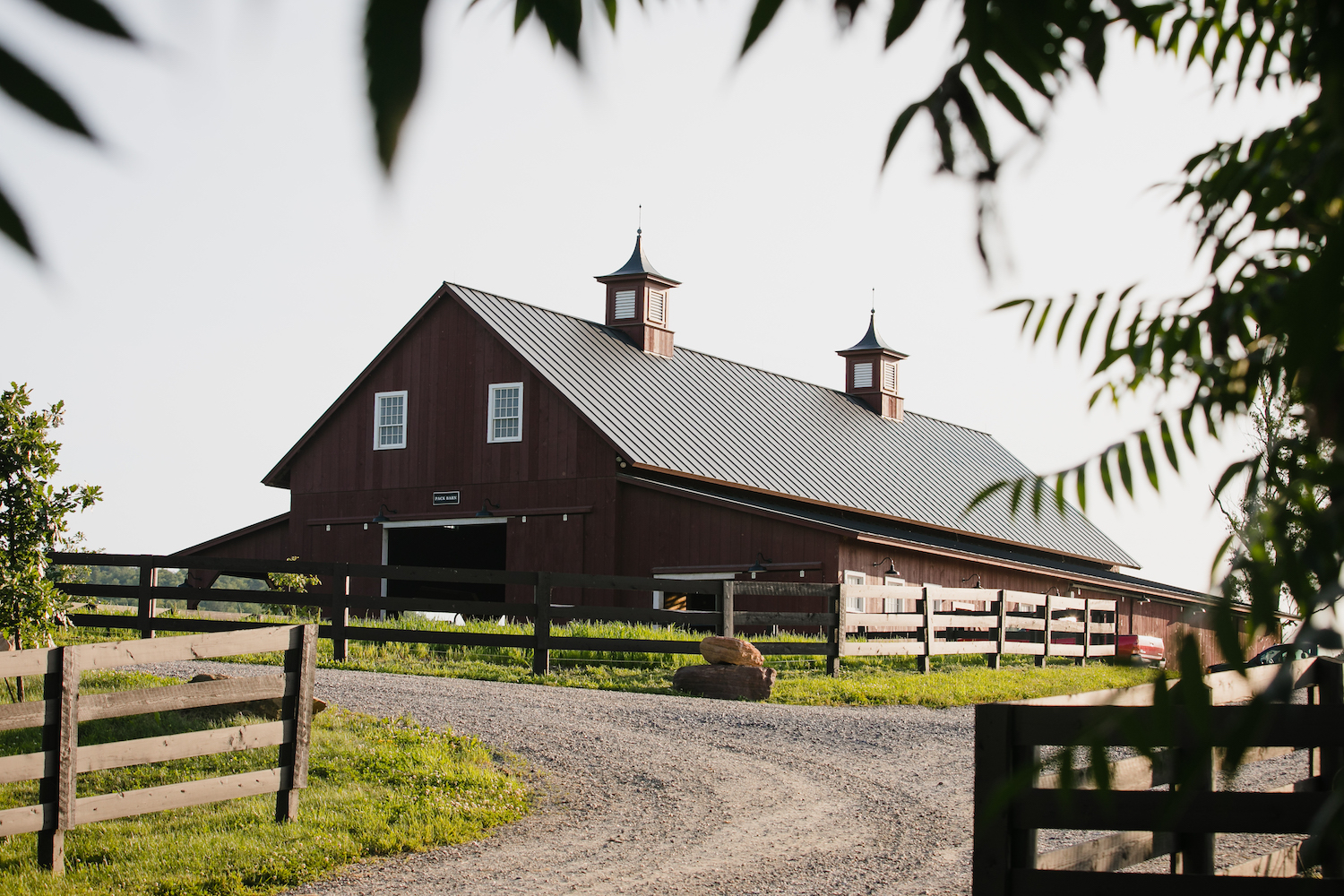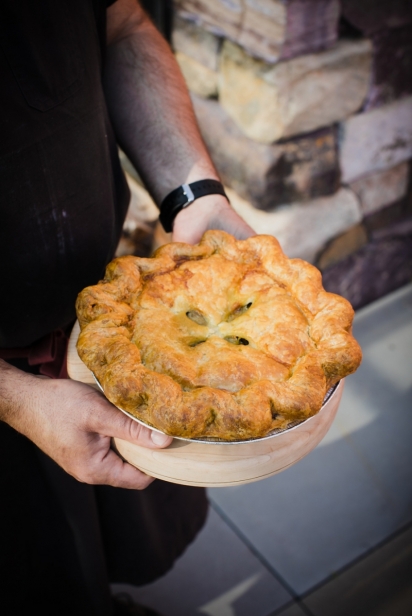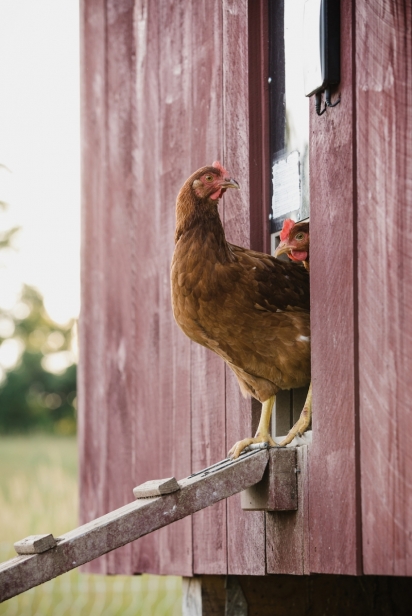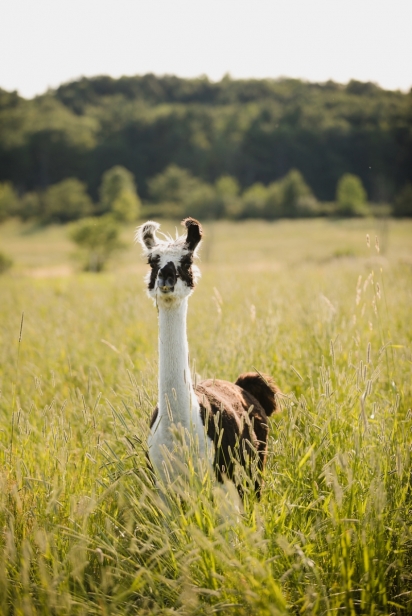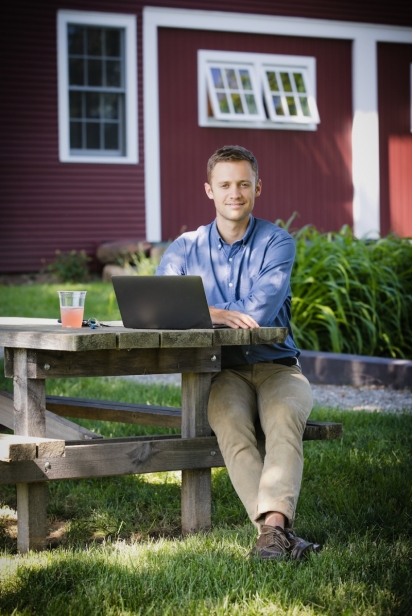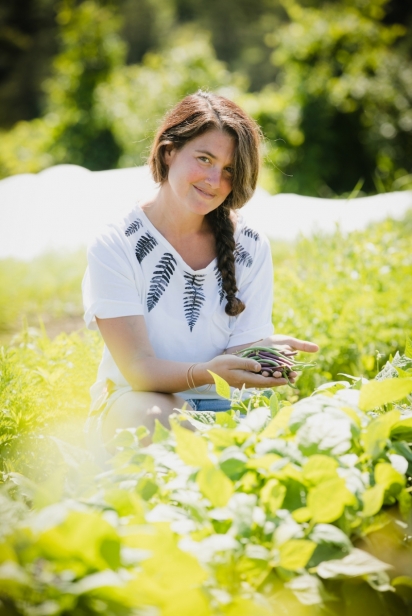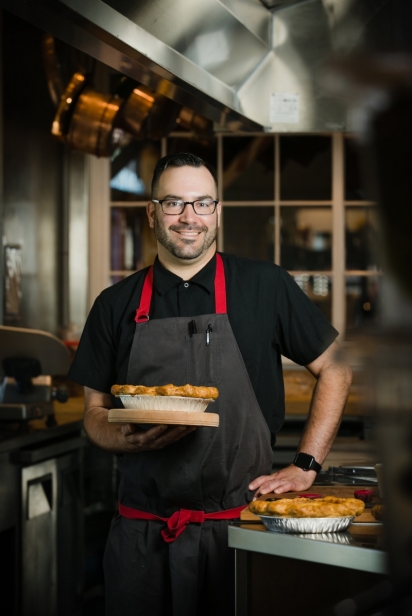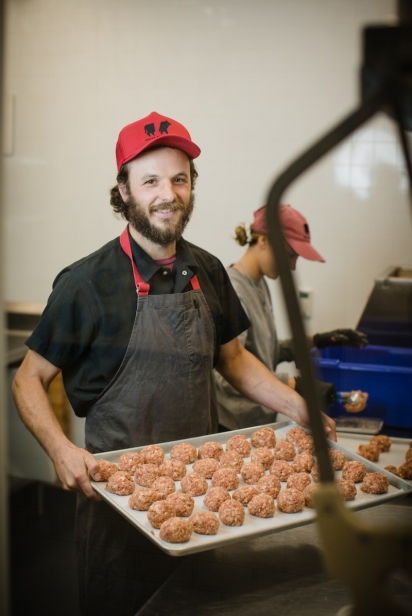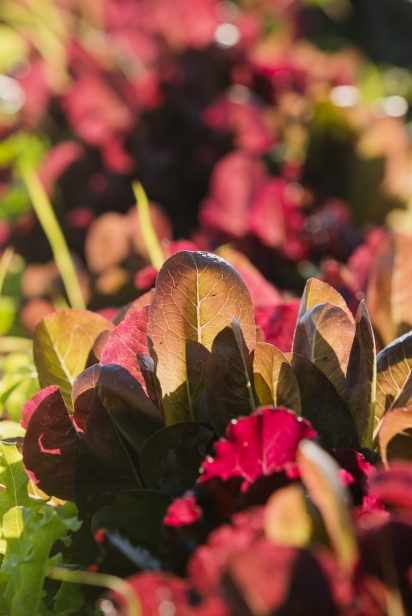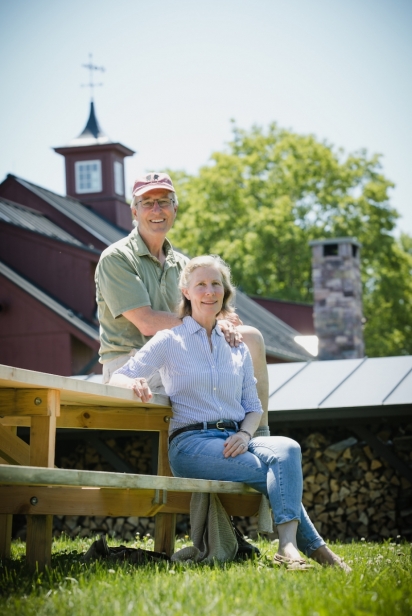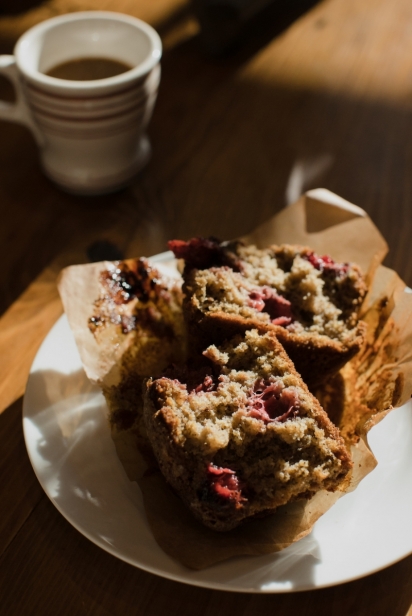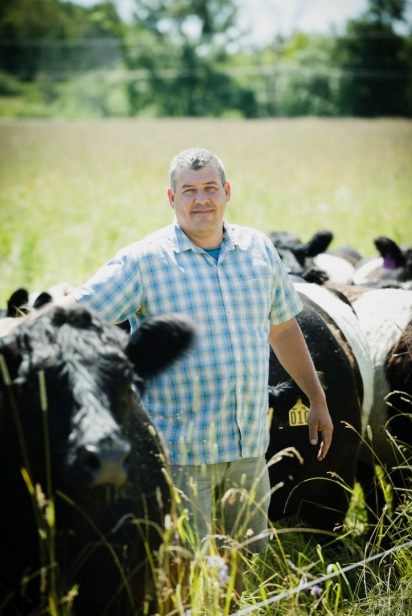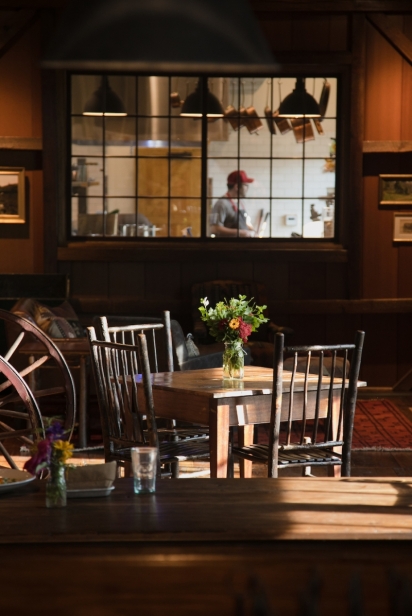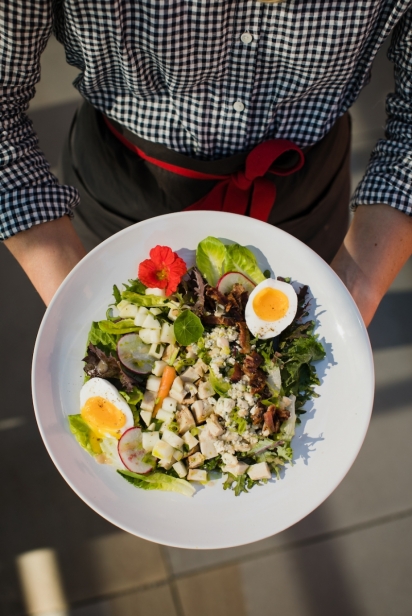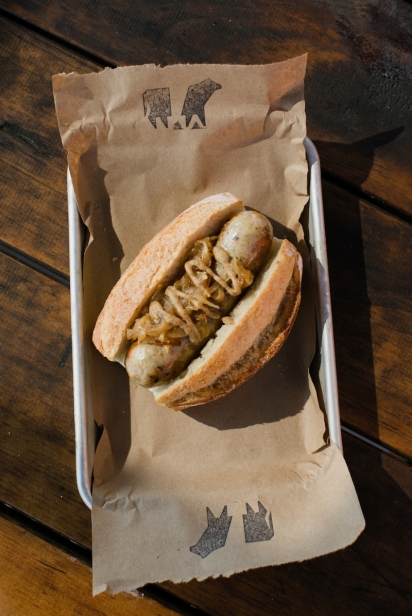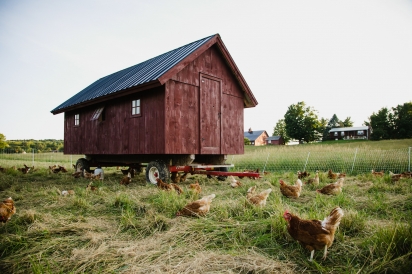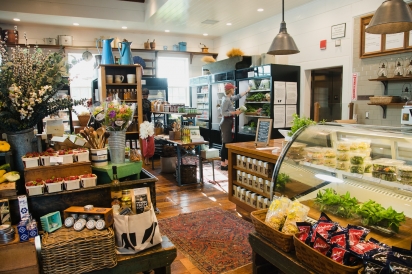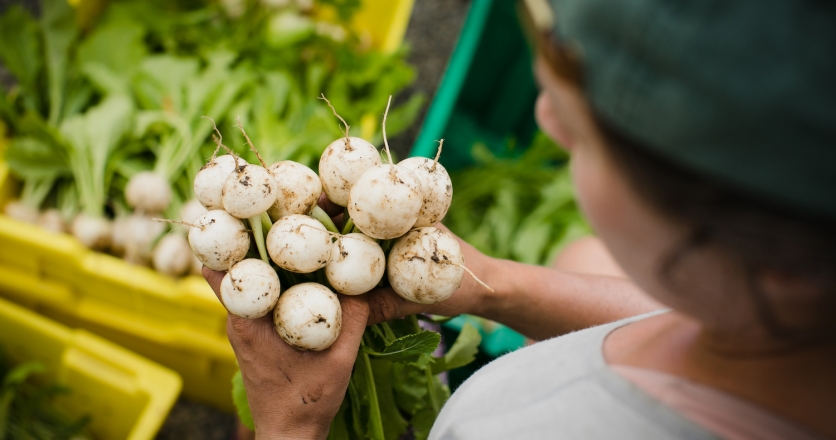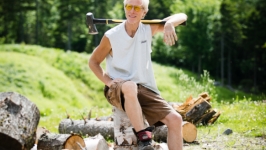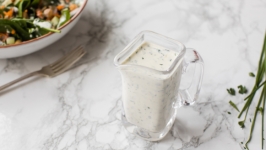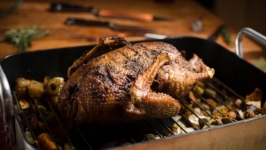Philo Ridge Farm
Chicken potpie—that’s where the essence of Philo Ridge Farm coalesces. Under Meg Dawson’s flaky pastry crust, succulent chicken raised by Ed Pitcavage and processed by Mike Kirk melds with Jane Engelman’s carrots, celery, onions and herbs. Chef Sean Richards pulls everything together in a savory stock-infused filling and pops the dish into his gleaming commercial oven.
It actually takes four days—or perhaps four months, if you factor in growing the veggies—and a lot of collaboration to bring this fragrant, deep-dish beauty to table. Diana McCargo and Peter Swift’s agricultural vision emerges tastefully in this humble yet elevated dish, much like the Charlotte farm that the couple has restored.
Diana and Peter bought the historic Foote Farm, a former dairy farm, in 2012 and have revived the 400 acres through regenerative agricultural practices. Philo Ridge Farm’s theory is simple: Heal the soils in order to nurture the cattle, sheep, poultry and pigs that graze the pastures. Compost from these animals enriches the two acres of certified organic veggies, fruits and botanicals. The farm’s hub, a handsomely restored 18th-century red barn, houses the farm café, market, commercial kitchens and a licensed meat-processing facility. Everything grown or raised on the farm is put to brilliant use by the talented culinary staff.
I spent a full day at Philo Ridge Farm in early spring and was certainly well fed. In between appreciative bites of the glorious chicken potpie, the key players responsible for the meal shared insights on the farm and their pathways there.
Diana McCargo, a lifelong organic gardener and devoted cook, has lived in Charlotte since 1985, a half-mile from the farm. Her husband, Peter Swift, is a retired oncologist who has long been interested in the link between human health and soil health. “Peter and I bought the farm with the goal of keeping it in active agriculture,” Diana explains.
What you see today is the evolution of that vision.
Soon after Diana and Peter took on the property, two young farmers from Charlotte, Vera Simon-Nobes and Michael Haulenbeek, approached them about leasing some pastures and barn space for their sheep and poultry business. “We were so happy to have them here,” Diana recounts. “Their energetic presence ultimately inspired us to develop what would become Philo Ridge Farm.”
Vera and Michael raised their sheep and broiler birds and sold the meat at the tiny farm stand for the next few years. Ed Pitcavage moved up from Massachusetts in 2016 to serve as land and livestock manager. He added Belted Galloways, Tamworth and Berkshire pigs, more sheep and chickens to the mix. Diana and Peter saw that the livestock, soils and pastures were thriving, so they expanded their vision and assembled a lively team of folks eager to grow. Gardens were established, and the community seemed eager to embrace this new venture at the crossroads. Construction began in earnest, and by June 2018, a bustling enterprise had blossomed fully. Philo Ridge Farm now employs around 30 people spread across land and livestock, market and kitchen, and the gardens.
According to Tad Cooke, a Charlotte native who serves as the farm’s general manager, “We wanted to focus on the agriculture first, get our systems down then develop the market and café. Everyone is amazed when they come here for the first time!”
The market has become a destination for coffee drinks, baked goods, fresh salads, sandwiches and soups. The rustic-chic interior invites lingering or stocking up on products from local artisans: wooden spoons, cutting boards, beeswax candles with dried flowers, woolen blankets from the farm’s sheep, leather totes, honey, and books by inspirational growers. Refrigerator cases are filled with meats and produce from other local farmers. “It’s all about building connections,” Tad continues. “We want to support small businesses, and our dollar can have a solid impact.”
As land and livestock manager, Ed Pitcavage oversees 200 acres of pasture and hay land. The rest of the farm is wetlands and woods. He orchestrates a complex matrix of rotational grazing patterns, which involves moving the cattle twice a day, followed by the sheep and the layers in their egg-mobiles. The broiler chickens graze successive swaths of land. “Everything we do is focused on improving the fertility of the land and providing fresh nutritional forage for the animals,” he notes.
Ed is rightfully proud of his cows.
“Belted Galloways are well suited to Vermont, and they marble beautifully off grass. The final 60 days are essential to flavor and texture, so we make sure our cows have the best pastures for the last two months. Our goal is to produce the best grass-fed, grass-finished beef we can.”
Mike Kirk, the farm’s meat processor, works closely with Ed and the livestock. The UVM graduate learned to slaughter and butcher on the homestead he shares with his partner. That experience sparked his interest, and he spent five years furthering his skills at an area meat-processing facility. “Since we have a license, I can bring in whole animals and break them down into cuts and charcuterie.” Mike collaborates with chef Sean Richards to understand his tastes and needs. “Good sausage is hard to come by, and Sean and I are kind of obsessed. Chorizo, lamb merguez, maple breakfast, fennel, and kielbasa are our mainstays. We’re working on the Farm Dog, an all-beef hot dog. And of course, our steaks and burgers are amazing!”
Jane Engelman has been the head gardener for several years. She developed two acres of permanent raised beds where an old dairy barn had once stood. Her commitment to biodiversity is evident in the rows of organic veggies interspersed with perennial berries, herbs and edible flowers. Young fruit trees parallel a fenced-in paddock, and two greenhouses allow for year-round production.
The Green Mountain College graduate has farmed all over the world and made her way back to Vermont. “It’s unique to work in a place where everyone has such experience in their field,” Jane notes. “We all use each other as resources to heighten our own programs. Because in the end, all aspects of a diversified farm work together to impact the whole: crops, pastures, gardens, kitchens. We’ll be building up the production side of the market garden and livestock over the next five years in order to meet increasing demand. However, our mission calls for making decisions based on what’s best for the land, so we’re sensitive to not exceeding our capacity.”
Meg Dawson, the pastry chef, has 12 years of restaurant experience, including stints at Bklyn Larder, Shelburne Farms and the Great Northern. She’s the genius behind the crunchy cornmeal cookie with lavender icing and pressed flowers. Strawberry rhubarb buckwheat muffins with herbs and edible flowers. Savory scones with goat cheese and caramelized onion. Tomato and zucchini galettes. Brown butter blondies with nuts, toasted coconut and caramelized white chocolate. And lest we forget, the whimsical birdseed cookie with toasted fennel.
“Most chefs and bakers rarely get the opportunity to step outside,” Meg reflects. “We’re heads-down in the kitchen. Here, we engage in the whole process, which actually makes us better cooks. We trust each other and learn from each other. In May, the market and kitchen staff closed down for a week and headed outside for hands-on work with Jane and her garden crew and with Ed and the animals. Likewise, the garden and livestock staff loves to see and taste what we do with their products.”
Chef Sean Richards grew up an hour south in Fair Haven. The New England Culinary Institute graduate worked at the acclaimed Blackberry Farm in Tennessee and later opened his own farm-to-table restaurant. Sean returned home to continue his career at a place that valued high-quality, farm-grown foods.
“I talk with Mike about meats. He has experience raising animals and I don’t. It’s helpful to understand where our animals graze and how the pasture grasses affect their flavor. Jane and I sit down with seed catalogs in winter and look ahead to the summer growing and cooking season. When I ran the restaurant in Knoxville, I had a beautiful farmers’ market. But I would go there to get my produce, and the farmers would just hand me the box. I didn’t get to be a part of the process. Here we can see the lambs being born, the plants starting in the greenhouse, the pigs and cows grazing and then coming through the meat processing rooms. Jane and her team work their butts off growing these beautiful veggies—I just try not to screw it up!”
Sean describes his approach as “beautiful product done simply.” Wood-fired grilled sausages, rib eye steaks, burgers. A dry-aged roast beef sandwich with arugula, tomato and herb mayo; a BLT with coveted farm bacon and basil mayo on housemade sourdough. Chopped salads with garden veggies and herb vinaigrette. Chicken schnitzel served with a crunchy salad and lemony vinaigrette.
“The best way to sustain this land is to manage it thoughtfully through agriculture,” general manager Tad Cooke reflects. “Peter and Diana could be retired and take the easy paths, but Peter is out in the field looking at water lines and Diana is jumping into the kitchen and involved with the gardens. They have a deep connection to this land and this community.”
To which Peter humbly responds, “We are so fortunate to have these collaborative, conscientious stewards of this land. For me, I love the opportunities to keep learning. It’s remarkable to watch the fertility and productivity improve. In just a few years of concentrated eff orts, we can clearly see the benefits of regenerative agriculture. We’ve gone from compacted soggy soil that drained poorly to lush pastures that sustain our livestock."
Diana sums up their ethos. “We’re constantly experimenting and figuring out what works for us. We wanted to find a way to help people make an honest living from the farm. We’re just happy to share this farmstead and good food with our community.”
Philo Ridge Farm | @philoridgefarm
Bklyn Larder | @bklynlarder
Shelburne Farms | @shelburnefarms
Great Northern | @thegreatnorthernvt
New England Culinary Institute | @neciculinary
Blackberry Farm | @blackberryfarm


